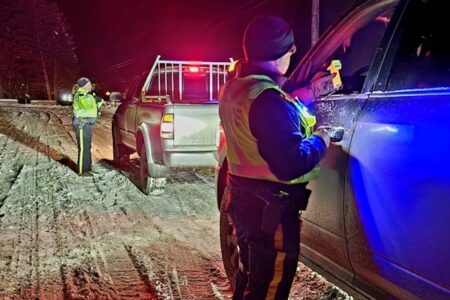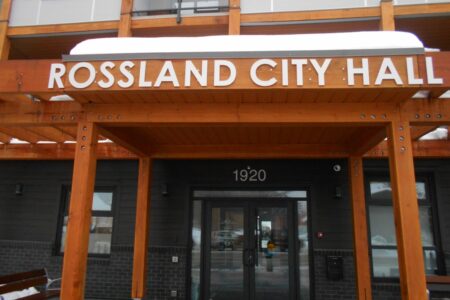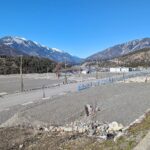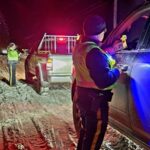The future of Trail Airport comes into focus?
The future of the Trail Regional Airport (TRA) has come into both sharper relief and greater ambiguity following the Aug. 21 release of the Regional District of Kootenay Boundary’s (RDKB) “TRA Economic Impact Assessment” (TRAEIA).
Wave Point Consulting’s TRAEIA (pdf) follows on the heels of the RDKB’s recent TRA Master Plan (pdf).
On a number of grounds, Wave Point clearly recommended caution before investing more into the TRA. Issues included the fact that airport revenues “flow outside of the region” with the airport’s single carrier, direct employment is low, the airport’s success hinges on volunteers who donate about 45 per cent of the work—a value of $180,825—”new additional traffic” from other carriers was deemed “not likely,” and they assessed that capital costs of expansion would “not be fully recoverable,” particularly given a risk for the service to decline.
“As a result, the financial burden will continue to rest on local taxpayers to the extent that additional monies cannot be obtained via senior levels of government,” Wave Point wrote.
The report also listed many benefits, not least the competitive effect of Pacific Coastal and the TRA on fares for services out of the West Kootenay Regional Airport in Castlegar, but the TRAEIA made it clear that the balance of costs and benefits of any future projects would need close attention in the context of risks and unknowns.
The RDKB’s East End Services Committee (EESC) is charged with debating regional airport issues, but their first meeting following the TRAEIA’s release was on Sept. 18. Now the RDKB site says discussion is deferred until the Oct. 24 meeting of the EESC “to allow adequate time for service participants to review and consider the information provided in the report with their respective Councils.”
On Aug. 22, the day after Wave Point Consulting submitted the TRAEIA, the City of Trail sent a letter to the RDKB requesting a “service review” of the TRA.
Trail wrote, “The City of Trail finds the lack of congruence and the apparent indifference to the service from several of the service participants an ongoing issue and concern in the context of advancing plans for the Regional Airport. There is further concern that the ongoing execution and development of future service enhancements is not progressing in a timely manner, and from this perspective, potential benefits and opportunities are being lost.”
Trail continued, “Recent decisions and statements [at the EESC] demonstrate there is a divided opinion and the participants contributing the majority of costs are now being outvoted by the minority financial contributors.”
A service review would, they wrote, “provide the opportunity for any participant that does not see benefit in the service to withdraw from the service…Trail Council views the service review as a positive opportunity to assess the terms and conditions of the service and confirm commitment to the Regional Airport moving forward and hope that our partners to the service will feel similarly.”
On Sept. 5, the RDKB agreed to initiate the review and asked that Trail appoint a representative. On Oct. 9, Trail appointed Coun. Cacchioni.
When Rossland council discussed the TRAEIA on Oct. 9, however, there were more questions than answers.
Coun. Kathy Wallace, Rossland’s RDKB director and a member of the EESC, opened the discussion: “Given that Trail has requested a review of the service, it’s difficult for [the EESC] to know how to proceed,” she said. “How do you make decisions about capital investment into a facility if you’re not sure who the partners will be?”
“I think that’s a significant point,” Mayor Greg Granstrom said, adding that he didn’t “understand the motivation” for Trail’s decision. “Trail called for a service review of a service they really support. If we don’t know who’s playing, how can we put our tax dollars in if we don’t know who’s there?” he asked.
Wallace said the report pointed to “significant costs that could possibly go into that facility…but the service is very much dependent on the carrier and is beyond the control of the service provider. The recommendation from the consultant is not to invest any more capital into a service that is duplicated elsewhere.”
Coun. Kathy Moore called the report “good and thorough.” She said, “This is a significant blow to people who were really anticipating doing a big investment in there.”
Moore said the report provides “excellent practical suggestions” such as delaying expansion until demand rises, getting taxpayer approval before any expansion, and that the best course of action is to wait. “There isn’t anything that [the EESC] can do until the service review is complete, with so many unknowns, we’ll just have to wait.”
Moore added, “Without volunteers, the whole thing falls apart.”
Coun. Jill Spearn concurred with Moore. “It shows the pitfalls for sure, and strongly. In a perfect world, we would have vital airport in Trail and a vital airport in Castlegar,” Spearn said. “But ridership numbers are not that significant for expansion of [the TRA]. Half of the service is volunteer, otherwise it’s not even feasible. We’ve got to be real about numbers and economy.”
Coun. Cary Fisher had a different point of view, noting that the TRAEIA pointed to volunteerism as a “weakness,” but he saw it as a “positive.”
“While I agree that the study is objective and thorough, there’s a part of me also that goes back to volunteerism. Every project that we do is dependent on volunteers,” he said, drawing on the Sustainability Commission’s award-winning Energy Diet as an example.
“All the things that were successes were based on volunteers. Those volunteers down there have the same passion as the volunteers up here at the Sustainability Commission,” he continued. “I’m still a big supporter of the people down there that volunteer. This community has a pile of things that are done that would never get done without those volunteers, and that goes for the Trail airport as well.”
Moore noted that the report cites volunteers as a “vulnerability” rather than a “weakness.” She said, “If you scale up, you get to the point you can’t rely on them. There aren’t enough volunteer hours in the day, and not enough of them. It’s not that they’re a weakness, it’s just that if you talk about expansion you’re going to run into trouble.”
Wallace added that RDKB staff have recommended a move away from volunteers, but the EESC had been awaiting the TRAEIA to decide. “The volunteers have been doing excellent work,” she said, “but it’s not a sustainable model.”
Fisher responded, “I really believe in picking an endpoint, visualizing something, and going for it [regardless of] obstacles.” He agreed there were “lots of obstacles” to the airport, but he said, “Ridership could go up. All the things we have suspicions about could fall by the wayside, and they could do it. People with vision are sorely missed in a lot of places. They have a vision for something down there.”

























